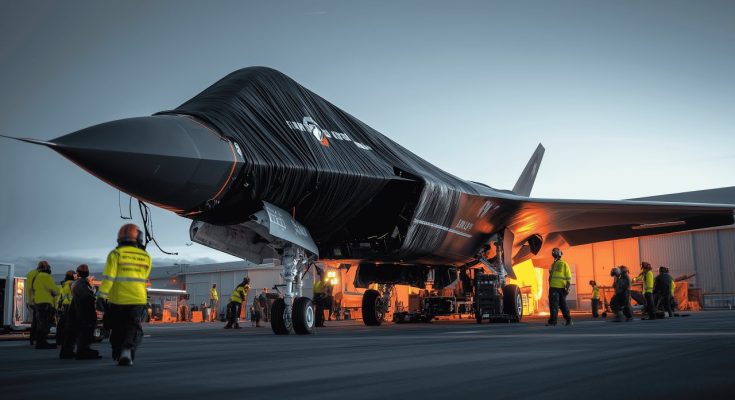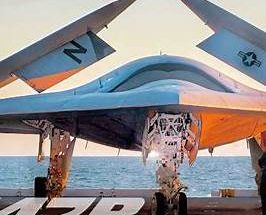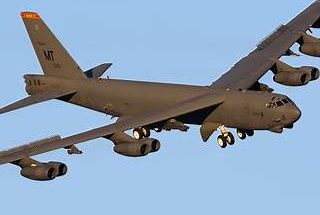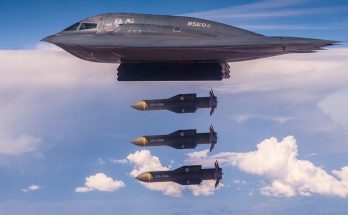The Stealth Jet the US Sold to Israel… Then REGRETTED Later
One of the most significant and controversial deals in the history of U.S.-Israel defense relations occurred when the United States sold Israel a fleet of advanced F-35 Stealth Fighter Jets—a decision that would later spark considerable regret and controversy within U.S. defense circles. The sale, which marked a milestone in military cooperation between the two countries, raised several concerns, both about the security implications for the United States and the potential for the technology to be leaked to adversaries.
The F-35 Deal: A Landmark Agreement
In 2008, after years of negotiations, Israel signed a historic deal with the United States to purchase the F-35 Lightning II, developed by Lockheed Martin. This was not just a regular sale; it was part of the U.S. government’s effort to maintain Israel’s military edge in the Middle East, given the region’s growing instability and the technological advancements of adversaries like Iran. The deal, which was valued at $2.75 billion for an initial batch of 19 aircraft, also marked a significant step in U.S.-Israel defense cooperation.
The F-35 was considered the most advanced multirole stealth fighter in the world at the time, with capabilities like low radar visibility, advanced avionics, and the ability to perform a variety of missions, including air-to-air combat, ground attack, and intelligence gathering. Its stealth features made it nearly undetectable by enemy radar, which is a strategic advantage in contested environments like the Middle East. Israel’s acquisition of the F-35 was hailed as a way to further cement the country’s qualitative military edge over its regional adversaries.
The Problem Emerges: Technology Transfer Concerns
While the initial sale was celebrated as a strong display of military and strategic alignment between the U.S. and Israel, the deal quickly took a problematic turn. As Israel received its first F-35s, the U.S. grew increasingly concerned about the potential risks associated with the transfer of sensitive technology. Israel, known for its highly sophisticated defense industry, was granted access to the F-35’s detailed blueprints and technical specifications, which could potentially lead to the jet’s stealth and avionics technology being reverse-engineered or sold to third-party countries.
The U.S. government had significant concerns over Israel’s strong military ties with countries that were not aligned with Western interests. The most notable example of this was China, a rising military power with whom Israel had shared defense technology in the past. Despite Israel’s assurances that its agreements would not compromise U.S. security, the risk of the F-35’s cutting-edge technology being exposed or even transferred to adversaries raised alarm bells in Washington.
In 2018, an investigation was launched into whether Israel had transferred any of the sensitive technologies from the F-35 to China or Russia. While no direct evidence of such transfers was found, the mere suspicion was enough to cause significant regret in the U.S. government. The potential for Israel’s defense contractors to independently upgrade or modify the F-35, combined with Israel’s growing partnerships in countries like China, raised fears about compromising the aircraft’s advanced systems.
Regret and Revisions to the Deal
In light of these concerns, the United States pushed Israel to adopt tighter controls around the F-35’s sensitive technology and parts. There were calls to limit Israel’s ability to alter or replicate key components of the aircraft, and to prevent the sale of related technologies to third-party countries. Furthermore, the U.S. demanded that Israel agree to a more rigorous monitoring system to ensure that no classified data from the F-35 was shared without U.S. approval.
However, the situation escalated further when Israel modified its F-35s with locally developed technology, including advanced electronic warfare systems and communication modules. While this was an effort to tailor the jets to Israeli operational needs, it further stoked fears within the U.S. that Israel’s independent modifications could expose vulnerabilities or inadvertently leak sensitive data.
Strategic Implications and the Bigger Picture
While the deal to sell F-35s to Israel remains in place, the subsequent complications and regrets reflect the delicate balance of trust that the U.S. must maintain with its allies, especially when dealing with state-of-the-art military technologies. Despite the tensions, Israel has remained a critical strategic partner to the U.S. in the Middle East, and the F-35 continues to play a central role in the Israeli Air Force’s modern defense strategy.
The controversy over the F-35 sale highlights a broader issue that the U.S. faces in the global arms market—the challenge of balancing military cooperation with national security. While providing cutting-edge weapons systems to key allies like Israel can enhance regional stability and strengthen military ties, it also brings significant risks in terms of technology leakage and the potential for unintended consequences.
Conclusion
The U.S. sale of the F-35 stealth fighter jets to Israel was initially seen as a major win for both nations, bolstering Israel’s military edge and reinforcing the U.S.-Israel defense relationship. However, over time, concerns about technology transfer, security breaches, and the potential exposure of classified systems have led to regret within the U.S. government. This situation underscores the complex nature of international defense agreements, where trust, technology, and geopolitics must be carefully managed to avoid strategic setbacks.



